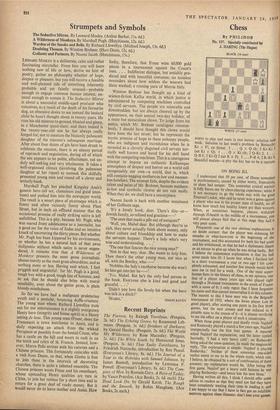Strumpets and Symbols
A Wilderness of Monkeys. By Marshall Pugh. (Hutchinson, 12s. 6d.) Warden of the Smoke and Bells. By Richard Llewellyn. (Michael Joseph, 13s. 6d.) LEONARD MOSLEY is a deliberate, calm and rather fascinating storyteller. From him you will learn nothing new of life or love, derive no hint of poetry, gather no philosophy whether of hope, despair or pleasure; but you will receive a feasible and well-planned tale of sOmething inherently probable and yet faintly unusual—probable enough to engage common human interest, un- usual enough to sustain it. The Seductive Mirror is about a successful middle-aged producer who conceives, as a result of the death of his favourite dog, an obsessive desire to see instead the bastard child he hasn't thought about in twenty years. He runs his old mistress to ground, bloated and ginny, in a Manchester quasi-slum; and there indeed is the twenty-year-old son he has always really longed for, not to mention the blatantly pubescent daughter of the mistress's subsequent marriage. After about four dozen of gin have been drunk to celebrate the reunion, there is an uneasy period of reproach and negotiation, during all of which the son appears to be polite, affectionate, not un- duly self-seeking and very wholesome. It takes a well-organised climax (involving the pubescent daughter at her ripest) to unmask this skilfully presented young man and round off a clever and writerly book.
Marshall Pugh has pinched Kingsley Amis's generic hero (all sex, clumsiness and good inten- tions) and pushed him into the newspaper world. The result is a smart piece of picaresque which is funny and often viciously funny about Fleet Street, but in such an offhand manner that the occasional promise of really striking satire is left unfulfilled. This is a pity, because Mr. Pugh, who was reared from adolescence as a journalist, has a good ear for the voice of Judas and an intuitive knack of uncovering the thirty pieces. But whether Mr. Pugh has been kippered by his environment, or whether he has a natural lack of that sreva indignatio without which satire is never engen- dered, it remains true that A Wilderness of Monkeys presents the most gross journalistic abuses merely as the most gross absurdities, and as nothing more or less. Having said which, I feel priggish and ungrateful : for Mr. Pugh is a good, tough boy with a good, tough line of humour, and to ask that he should also brim with moral sensibility, even about the gutter press, is plain bloody-mindedness.
So far we have had a malignant proletarian youth and a pustular, bouncing duffle-creature. The young man whom Richard Llewellyn trots out for our entertainment is a slightly overgrown Henty hero (integrity and house spirit) in a Henty setting de luxe. This young man (Franc, short for Francesco) is town watchman to Assisi, and is daily expecting an attack from the wicked Perugians or possibly from the bestial Count, who has a castle on the hill and wants to cash in on the tomb and relics of St. Francis. Instead, how- ever, Marco Polo arrives with his caravan and a Chinese princess. This fortunately coincides with a visit from Dante, so that, when Giotto is free to join them in the intervals of decorating churches, there is quite a talented ensemble. The Chinese princess wants Franc and his sweetheart, whose upstanding Henty qualities are rare in China, to join her retinue for a short time and in return for a great deal of ready money. But it would never do to leave mother and Assisi. How lucky, therefore, that Franc wins 60,000 gold pieces in a tournament against the Count's men. . . . Indifferent dialogue, but amiably pro- duced and with beautiful costumes; no tasteless reminders about how seldom the wearers had them washed; a rousing yarn of Merrie Italy.
Winston Brebner has thought up a kind of science-fiction Kafka world, in which justice is administered by computing machines controlled by civil servants. The people are miserable and downtrodden, but are always cheered up by the appearance, on their annual two-day holiday, of a mute but miraculous clown. To judge from his antics, which Mr. Brebner catalogues remorse- lessly, I should have thought this clown would have been the last straw; but he represents the mystic promise of hope to these unhappy people, who are indignant and incredulous when he is revealed as a cleverly disguised civil servant nor- mally well known and hated for his deft hand with the computing machines. This is a courageous attempt to impose an authentic Kafkaesque atmosphere of despair and horror on a world still recognisably our own—a world, that is, which still contains nagging mothers-in-law and manner- less hoteliers. The attempt fails, despite the evident talent and pains of Mr. Brebner, because mothers- in-law and symbolic clowns do not mix easily. When they do, we shall have a masterpiece.
Naomi Jacob is back with another instalment of her Gollantz saga.
'It's a lovely book, dear. There's this—er- Jewish family, so refined and gracious—' 'The ones that made a pile out of antiques?'
'Well, yes, Mabel dear. But although they're so rich, they never actually think about money, Only about culture and friendship and how to make the servants happier. There's a lady who's very wise and understanding. . .
'The one that fancies the nice young man?'
'Not in that way, dear. She wants to help him. Then there's the other young man, not nice at all, with the Bentley, who—' 'Nobbles the lady's racehorse because she won't let him get into her be—' 'Yes, Mabel. But he's the only bad person in the book. Everyone else is kind and good and graceful. . .
'Didn't you love the lovely bit when the hero was sick in a ditch?'


































 Previous page
Previous page